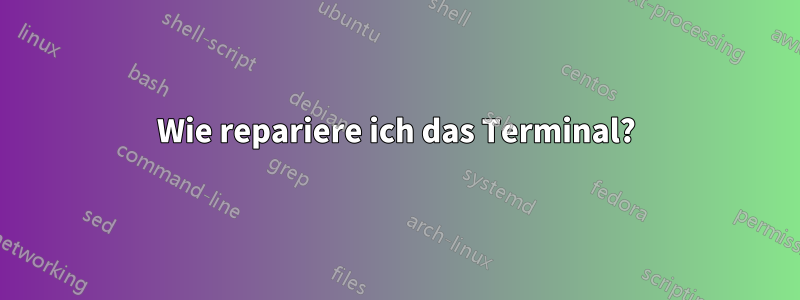
Ich versuche, das Terminal zu verwenden. Wenn ich jedoch ein Terminalfenster öffne, wird es geöffnet, dann wird eine Menge Text ausgeführt und es schließt sich in weniger als einer Sekunde von selbst. Wie repariere ich das Terminal?
Antwort1
Wenn Sie das Terminal mit Ctrl+ Alt+ aufrufen, wird Tein Skript mit dem Namen ~/.bashrcausgeführt. Dieses Skript wurde möglicherweise so geändert, dass es Befehle falsch ausführt und dann beendet wird, ohne jemals die Eingabeaufforderung anzuzeigen.
Meine ~/.bashrc-Datei (Ubuntu 16.04 unverändert) enthält Folgendes:
# ~/.bashrc: executed by bash(1) for non-login shells.
# see /usr/share/doc/bash/examples/startup-files (in the package bash-doc)
# for examples
# If not running interactively, don't do anything
case $- in
*i*) ;;
*) return;;
esac
# don't put duplicate lines or lines starting with space in the history.
# See bash(1) for more options
HISTCONTROL=ignoreboth
# append to the history file, don't overwrite it
shopt -s histappend
# for setting history length see HISTSIZE and HISTFILESIZE in bash(1)
HISTSIZE=1000
HISTFILESIZE=2000
# check the window size after each command and, if necessary,
# update the values of LINES and COLUMNS.
shopt -s checkwinsize
# If set, the pattern "**" used in a pathname expansion context will
# match all files and zero or more directories and subdirectories.
#shopt -s globstar
# make less more friendly for non-text input files, see lesspipe(1)
[ -x /usr/bin/lesspipe ] && eval "$(SHELL=/bin/sh lesspipe)"
# set variable identifying the chroot you work in (used in the prompt below)
if [ -z "${debian_chroot:-}" ] && [ -r /etc/debian_chroot ]; then
debian_chroot=$(cat /etc/debian_chroot)
fi
# set a fancy prompt (non-color, unless we know we "want" color)
case "$TERM" in
xterm-color) color_prompt=yes;;
esac
# uncomment for a colored prompt, if the terminal has the capability; turned
# off by default to not distract the user: the focus in a terminal window
# should be on the output of commands, not on the prompt
#force_color_prompt=yes
if [ -n "$force_color_prompt" ]; then
if [ -x /usr/bin/tput ] && tput setaf 1 >&/dev/null; then
# We have color support; assume it's compliant with Ecma-48
# (ISO/IEC-6429). (Lack of such support is extremely rare, and such
# a case would tend to support setf rather than setaf.)
color_prompt=yes
else
color_prompt=
fi
fi
if [ "$color_prompt" = yes ]; then
PS1='${debian_chroot:+($debian_chroot)}\[\033[01;32m\]\u@\h\[\033[00m\]:\[\033[01;34m\]\w\[\033[00m\]\$ '
else
PS1='${debian_chroot:+($debian_chroot)}\u@\h:\w\$ '
fi
unset color_prompt force_color_prompt
# If this is an xterm set the title to user@host:dir
case "$TERM" in
xterm*|rxvt*)
PS1="\[\e]0;${debian_chroot:+($debian_chroot)}\u@\h: \w\a\]$PS1"
;;
*)
;;
esac
# enable color support of ls and also add handy aliases
if [ -x /usr/bin/dircolors ]; then
test -r ~/.dircolors && eval "$(dircolors -b ~/.dircolors)" || eval "$(dircolors -b)"
alias ls='ls --color=auto'
#alias dir='dir --color=auto'
#alias vdir='vdir --color=auto'
alias grep='grep --color=auto'
alias fgrep='fgrep --color=auto'
alias egrep='egrep --color=auto'
fi
# some more ls aliases
alias ll='ls -alF'
alias la='ls -A'
alias l='ls -CF'
# Add an "alert" alias for long running commands. Use like so:
# sleep 10; alert
alias alert='notify-send --urgency=low -i "$([ $? = 0 ] && echo terminal || echo error)" "$(history|tail -n1|sed -e '\''s/^\s*[0-9]\+\s*//;s/[;&|]\s*alert$//'\'')"'
# Alias definitions.
# You may want to put all your additions into a separate file like
# ~/.bash_aliases, instead of adding them here directly.
# See /usr/share/doc/bash-doc/examples in the bash-doc package.
if [ -f ~/.bash_aliases ]; then
. ~/.bash_aliases
fi
# enable programmable completion features (you don't need to enable
# this, if it's already enabled in /etc/bash.bashrc and /etc/profile
# sources /etc/bash.bashrc).
if ! shopt -oq posix; then
if [ -f /usr/share/bash-completion/bash_completion ]; then
. /usr/share/bash-completion/bash_completion
elif [ -f /etc/bash_completion ]; then
. /etc/bash_completion
fi
fi
Navigieren Sie mit dem Dateimanager Nautilus zu Ihrem Home-Verzeichnis und doppelklicken Sie auf Ihre .bashrc-Datei. So mühsam es auch klingt, vergleichen Sie Ihre .bashrc-Datei mit der oben aufgeführten, um Unterschiede festzustellen und die Fehler zu beheben.
Alternativ ist es wahrscheinlich sicher, den obigen Text zu kopieren und ihn in Ihre .bashrc-Datei einzufügen. Da diese ohnehin kaputt ist, gibt es nichts zu verlieren.
Es gibt noch weitere Dateien: ~/.profile, ~/.bash_profiledie ~/.bash_loginebenfalls analysiert werden können, aber ~/.bashrcnur als Ausgangspunkt dienen.
Das Terminal ist ein integraler Bestandteil von Ubuntu und Linux, den 99 % der Benutzer gelegentlich und viele Benutzer häufig verwenden müssen. Es ist wichtig, sicherzustellen, dass das Terminal funktioniert.
Wenn Sie vor dem Upgrade ein Backup erstellt haben, sollten Sie es wiederherstellen und das Upgrade wiederholen, da neben Terminal auch andere Dinge beschädigt sein könnten. Wenn es sich um eine brandneue Installation handelt, installieren Sie es einfach erneut mit einer neuen Ubuntu Live-DVD oder einem neuen USB-Stick.


